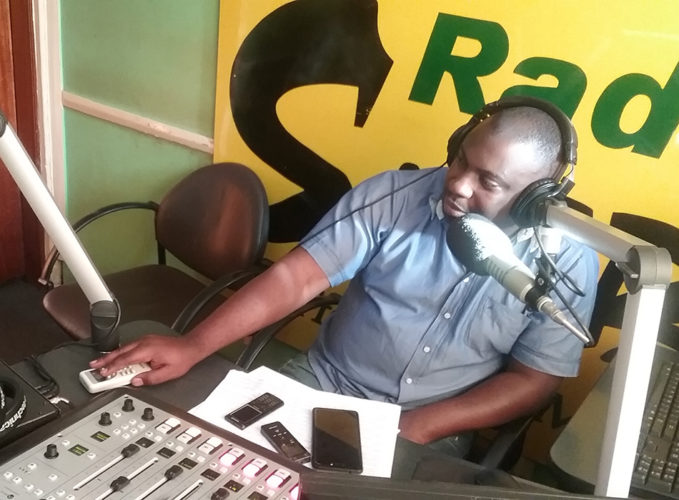Sometimes, the impact of Farm Radio programs reaches beyond the target audience of small scale women and men farmers in sub-Saharan Africa. This was the case in Uganda’s central region, where broadcasters at Radio Simba in Kampala listened intently to a series broadcast nearly 10 years ago, which has inspired a sustainable radio program that continues at the station today.
“My Children” was a radio drama that first aired in 2013 to educate farmers on the value of nutritious, vitamin A-rich orange-fleshed sweet potatoes. In the series, Florence, her husband Rolland, and their neighbour Nora were embroiled in a story of love, domestic strife, money, power and, of course, orange-fleshed sweet potatoes. It was broadcast in six languages by 10 radio stations and helped to increase awareness of and demand for orange-fleshed sweet potatoes among smallholder farmers in Uganda. The second season wrapped up in 2016.
“After listening into this program on another radio station, we thought that it was very good content for our listeners, so we decided to take it on,” said Mubiru Ali, the host and producer of the farmer program ‘Lutabanjaliire’ (which translates to ‘A table of experts’), and a former recipient of Farm Radio International’s George Atkins Communication Award. “The program piqued our interests because of the nutritional value of the orange sweet potato and the economic aspect.”
As well as promoting the economic benefits of growing orange fleshed sweet potato among smallholder farmers, co-producer Allan Kisange said they also saw an opportunity to develop a sustainable radio program by expanding the program’s reach and financing it with support from local agricultural businesses.
“There were farmers that were not catered for, so this program was adding more numbers to the radio station,” he said, adding that the station has become so popular among farmers that several companies now advertise their products and services throughout the program, which makes it sustainably viable.
Persevering amid the pandemic
While Ali says many farmers still call or text into the program with questions about orange fleshed sweet potatoes, the broadcasting team makes sure to cover a range of issues that are relevant to their local listeners. Recently, Lutabanjaliire has broadcast episodes on climate change and land preparation for the upcoming dry season that runs from January to March. The program takes on multiple formats including Q&A, interview and drama, and it airs every Sunday evening, with a repeat on Saturday mornings. But as a result of the government-imposed curfew during the pandemic, Ali says they have been forced to broadcast recorded episodes.
“We have limited live programs, because our boda bodas (local transport busses) stop moving at five, and curfew requires us to stop moving at 7pm. So it’s a pre-recorded show that is recorded during the day and we integrate all of the questions that we are asked during the previous week,” he said.
Listeners text in their questions or comments to the radio station phone line — an interactive element that is made easier thanks to an early Farm Radio technology: the Voxbox, which was piloted at Radio Simba. Voxbox provides radio hosts and studio operators with an interface for managing on-air listener interactions, including incoming and outgoing calls, conference calls and SMS. The application can run on a computer, smartphone and tablet and it does not require an active internet connection.
“It has worked well for us because we can get instant messages from our listeners and a backup on email so you can read them instantly. I go through them on the weekend as we are recording the show so we can address the issues,” said Ali.
Utilizing Farm Radio Resources
With the challenges brought about by the COVID-19 pandemic including nightly curfews, reduced staff capacity in the radio station and limitations on community visits, Ali and Allan say Farm Radio’s broadcaster resources remain important sources of information.
“All of these resources are useful in creating a meaningful program that integrates women and that is remembered by the listeners,” said Ali, adding that Radio Simba works hard to meet their listeners’ needs and keep them coming back for more. “We integrate the farmers’ voices into our program which brings them nearer to the program … They feel this is a program that is designed for them.”
Farm Radio’s long standing partnership with Radio Simba shows how broadcasters can access quality information and implement innovative technologies to develop sustainable radio programs that keep rural communities tuned in long into the future.
The “My Children” radio dramas and subsequent project was done in partnership with Farm Radio International, HarvestPlus, and TRAC FM in Uganda. The thirty-episode series combined health and agricultural education with an entertaining plot. Following each five-minute episode, participating radio stations provide follow-up information and use interactive SMS-based voting systems provided by TRAC FM to measure knowledge acquisition and impact.


Comments are closed, but trackbacks and pingbacks are open.